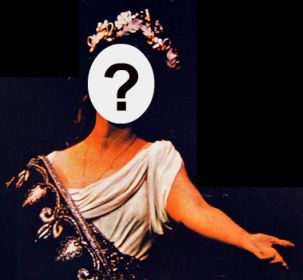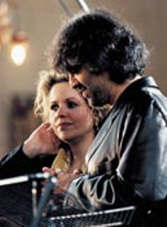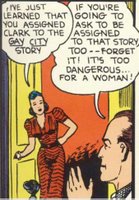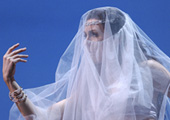
La Cieca was just wondering about something yesterday on
opera-l, and doggone if
Anne Midgette wasn't wondering about the same thing today in the
New York Times. (That woman haunts my dreams, I tell you. It's like she's inside my head. Now, where was I? Oh, yes...) The point that dear Anne and I (among others) have mulling is this:
There was a time when
Norma was considered a rarity or at least an opera that could be revived only when a very special prima donna was available and willing. The first Met Norma, for example, was
Lilli Lehmann, the house's biggest female star of that era. Even given Lehmann's
réclame, her appearance as Norma was considered by at least one critic (
W. J. Henderson in
Times) to be a sort of stunt:
The opera was chosen by Fräu Lehmann for her benefit, and from a financial point of view her selection was a very wise one . . . . From an artistic point of view the choice does not seem to be so commendable. There is no artistic reason why Lilli Lehmann should present herself to the New York public as a colorature singer. She may have been actuated by a not unnatural desire to display her versatility, but to get up a performance of Bellini's "Norma" for her benefit savors rather of self-esteem than of a strong devotion to honest art . . . . She demonstrated that her voice possessed far more flexibility and that she had a greater command of the pure ornamentation of signing that anyone suspected ... It must be said, however, that Fräu Lehmann took many of the elaborate ornamental passages at a very moderate tempo and sang them with very evident labor, thus depriving them of much of that brilliancy which the smooth, mellow, pliable Italian voices impart to them. Fiorituri without brilliancy have no "raison d' étre," and no Italian diva of standing would have received half the applause that Fräu Lehmann did for singing these passages as she did. The audience was excited by astonishment at the fact that she could do it at all.
Well, that was a longer pullquote than La Cieca originally intended to use, but, goodness, that is such excellent critical writing, isn't it? Anyway, back to the argument. Lehmann,
Rosa Ponselle,
Gina Cigna,
Zinka Milanov and of course
Maria Callas were all big established stars when they took on
Norma at the Met. So were
Joan Sutherland and
Montserrat Caballé. If
Shirley Verrett,
Renata Scotto and
Jane Eaglen received mixed reviews for their Met performances of the opera, it wasn't because of lack of star power or clout -- they were all extremely important names on the Met roster at the time of their casting.
Then there are performances from the likes of
Adelaide Negri and
Marisa Galvany -- (covers who had to go on) and
Rita Hunter, one of the many jumpers-in for Caballé. The presence of
Hasmik Papian at the beginning of this year's run of Norma should be understood in the same spirit, i.e., a late-in-the-game substitution.
Papian is going on for
Maria Guleghina, who was pulled out of the beginning of the
Norma run to perform the new production of
Macbeth. So the question is, who ever dreamed up the notion of Guleghina singing Norma at the Met? True, she won a big popular success here with Abigaille back in 2001 and she more or less owned the role of Tosca at the house for about five years. But nothing in those performances (or, to be frank, her few attempts at the Bellini opera elsewhere) really shouts "this woman
must do
Norma at the Met." So why would a revival of
Norma be put in the pipeline five years ago for a singer who neither then nor now promises to display anything special in the role?
Which is why La Cieca poses the question: was this revival of
Norma originally planned for a different singer? And if so, who?
Deborah Voigt?
Violeta Urmana?
Renée Fleming?
Labels: bel canto, caballe, critic, fleming, met, midgette, nyt, scotto, voigt
 The Washington National Opera has announced their 2008-2009 season will feature headliners Renée Fleming and Andrea Bocelli under the artistic direction of Plácido Domingo. According to an article by Our Own Anne Midgette in today's Washington Post, The Beautiful Voice will grace a new production of Donizetti's Lucrezia Borgia, an opera that has deep personal significance for the diva. Directing the opera will be "John Pascoe, a friend of Fleming's." Pascoe designed the leather jerkin Erwin Schrott sported in last season's Don Giovanni at WNO, so his credentials as an FOF are already well-established.
The Washington National Opera has announced their 2008-2009 season will feature headliners Renée Fleming and Andrea Bocelli under the artistic direction of Plácido Domingo. According to an article by Our Own Anne Midgette in today's Washington Post, The Beautiful Voice will grace a new production of Donizetti's Lucrezia Borgia, an opera that has deep personal significance for the diva. Directing the opera will be "John Pascoe, a friend of Fleming's." Pascoe designed the leather jerkin Erwin Schrott sported in last season's Don Giovanni at WNO, so his credentials as an FOF are already well-established.
 La Cieca was just wondering about something yesterday on
La Cieca was just wondering about something yesterday on  Adept arbiter
Adept arbiter  La Cieca has just been informed that soprano Mary Dunleavy will participate in tonight's panel discussion "Opera and Technology" at The Italian Academy for Advanced Studies in America at Columbia University. No word on whether La Dunleavy replaces or supplements the previously announced Lucy Shelton. Our own JJ will be
La Cieca has just been informed that soprano Mary Dunleavy will participate in tonight's panel discussion "Opera and Technology" at The Italian Academy for Advanced Studies in America at Columbia University. No word on whether La Dunleavy replaces or supplements the previously announced Lucy Shelton. Our own JJ will be 










